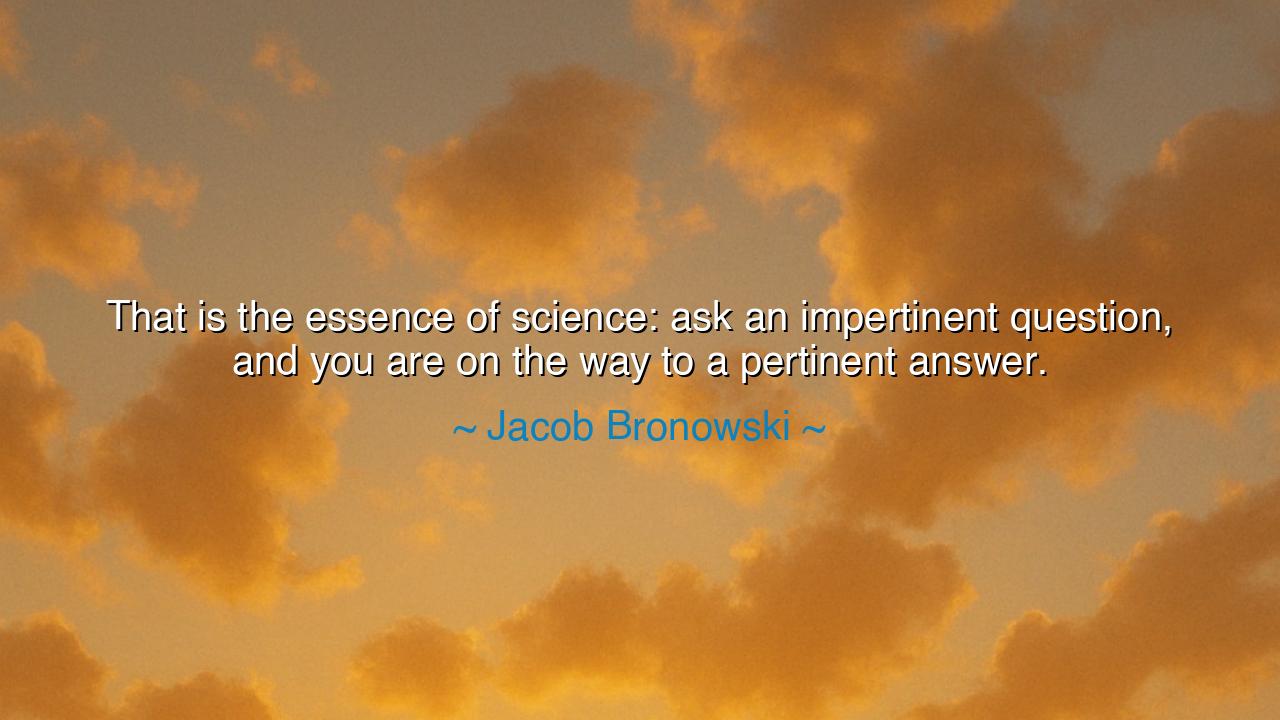
That is the essence of science: ask an impertinent question, and
That is the essence of science: ask an impertinent question, and you are on the way to a pertinent answer.






Hear, O Seekers of Knowledge, the words of Jacob Bronowski, who speaks to us of the heart of science—the courage to ask the impertinent question, the question that challenges the established order, the question that dares to seek the truth hidden beneath layers of assumption. "That is the essence of science: ask an impertinent question, and you are on the way to a pertinent answer." In these words, Bronowski invites us to see that the true pursuit of science begins not with comfortable, well-worn paths, but with a question that rattles the very foundations of what we think we know. It is the boldness to question, to doubt, to challenge that sets the mind on the path to understanding.
In the ancient world, the great philosophers were not content with the answers they were given by their predecessors, nor were they bound by the traditions of their time. Socrates, that most revered of thinkers, was famous for his method of questioning—what we now call the Socratic method. He believed that true wisdom came not from the answers we possess but from the questions we dare to ask. Just as Socrates asked those around him impertinent questions that caused them to question their assumptions, so too did Bronowski see that the essence of science lies in the same boldness to ask what others may consider too daring or too uncomfortable to ask.
Consider, O Seekers, the story of Galileo Galilei, a man whose impertinent question shook the very heavens. For centuries, the Earth was thought to be the center of the universe, and the idea that the Earth moved was a heresy punishable by death. But Galileo, through his telescope, dared to ask, "What if the heavens do not follow the rules we have set for them?" With this question, Galileo began a journey that would forever alter our understanding of the cosmos. His impertinent question about the motion of the planets led to the pertinent answer that the Earth, along with the other planets, revolved around the sun. Galileo’s courage to ask the difficult question, even in the face of opposition and danger, is a shining example of what Bronowski meant—science is about daring to question the unquestionable.
Bronowski’s words echo in the story of Marie Curie, who, as a woman in a male-dominated field, asked the impertinent question that would lead her to discover the radioactive elements polonium and radium. At a time when science was viewed as the domain of men, and when no one had yet grasped the mysteries of the atom, Curie’s relentless pursuit of answers led her to challenge the prevailing assumptions of her time. Her impertinent questions about the nature of radioactivity were the foundation upon which she built a legacy of discovery. By daring to ask questions that others feared, she opened the doors to a new era of science and medicine.
The lesson for us, O Seekers, is clear: science—like all great endeavors—is built upon the courage to question, to challenge the status quo, and to doubt what has been handed down. Without impertinent questions, there can be no pertinent answers. The path of knowledge is not a straight line of accepted truths, but a winding road marked by the boldness of those who have dared to question, who have been unafraid to ask what others might think too bold, too inconvenient, or too impossible. It is the doubters and the questioners who have led humanity forward, from the discovery of the earth’s orbit to the revelation of the structure of DNA.
So, O Seekers, I say unto you: Do not fear the impertinent question. Let it be the spark that ignites your curiosity, that pushes you to seek the unknown, and that drives you to uncover the truths that lie just beyond the veil. In your studies, in your work, in your lives, ask the questions that make others uncomfortable. Challenge assumptions. Doubt what you know, and let the search for answers be the guide that leads you forward. Whether you are in the realm of science, art, or life, it is in the courage to question that you will find the most profound discoveries.
Remember, O Seekers, that science—and indeed all human progress—begins not with answers but with questions. The greatest minds in history have always been those who dared to look at the world with fresh eyes, who saw the questions that others overlooked. Like Galileo, like Curie, like Socrates, you must ask the questions that stir the very foundations of your understanding. And in doing so, you will uncover the answers that shape the future and illuminate the path for those who come after you. So ask, O Seekers, and in your asking, may you find the keys to a world of infinite knowledge.






AAdministratorAdministrator
Welcome, honored guests. Please leave a comment, we will respond soon